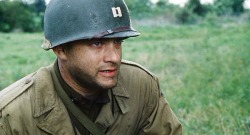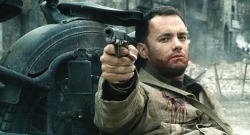Captain John H. Miller

Before joining the Army, John Miller had been employed at Thomas Alva Edison High School in Addley, Pennsylvania, were he had taught English composition since 1933. Miller was married and was also the coach of the local baseball team.
Volunteering for the Rangers, Miller served in Tunisia, Africa (Kasserine Pass) in 1942/43, where he first met Mike Horvath, an honest and dependable NCO. The two would serve together during Operation Torch, the Allied landings at Anzio, Italy in 1943. Transferring to the 2nd Ranger Battalion, Miller and Horvath next prepared for the assault on Hitler's vaunted Atlantic Wall defenses as part of Operation Overlord. Miller was somewhat of a mystery to his men, who were so intrigued by their commanding officer that they set up a betting pool to reward whomever could find out details about Miller's civilian life. Just before the Rangers embarked at Portsmouth, England, Miller's right hand began to shake uncontrollably.
On D-Day, June 6th, 1944 Miller led Company C of the 2nd Ranger Battalion onto Omaha Beach. Miller's men suffered high casualties during the attack, but the German defenses were too weak to hold off the flow of American soldiers and equipment. The Rangers conducted numerous operations for the next few days, and on June 9th Miller was given a special mission to retrieve a 101st Airborne paratrooper, Private James Ryan, whose three brothers had been recently killed in combat. Picking out a squad of men from Company C (Horvath, Reiben, Jackson, Mellish, Wade and Caparzo), together with Corporal Upham of the 29th Infantry Division, Miller and his men set out for Neuville to search for Ryan.
Shortly after arriving in Neuville, Private Adrian Caparzo was killed by a German sniper. After a case of mistaken identity involving a 101st Airborne soldier with a name similar to Ryan's, Miller learned of Ryan's rally point from a fellow paratrooper. The squad settled down in an abandoned church for a few hours of rest, and Miller revealed to Horvath his method of justifying his actions—that those lives lost under his command would save the lives of others. Miller had lost 94 men under his command, and the stress of combat could be seen in his trembling hand.
Making their way to the rally point, Miller and his squad found a field into which numerous gliders had landed or crashed. Here they found a 101st Airborne paratrooper who had known Ryan, and indicated that Ryan had set out with a mixed unit to defend a bridge at Ramelle.
Continuing the search, the squad next encountered a German machine gun emplacement. Miller's men were reluctant to attack the position, but Miller was steadfast and set on destroying it in spite of the risk. Medic Wade was killed during the attack, and a lone German was taken prisoner. Although affected by Wade's death, Miller was forced to let the German go in the hope that he would be picked up by advancing Allied forces.
The release of the prisoner was too much for Private Reiben, who turned on Miller and refused to continue with the mission. When the intervention of Horvath wasn't enough, Miller surprised everyone by suddenly revealing his home town and civilian occupation. Opening up to his men for the first time, Miller made it clear that he followed orders from his superiors in order to expedite his own return home to his wife, and that every soldier that died under his command made that goal more distant. Reiben silently rejoined the squad, and after Wade's burial they proceeded on to Ramelle.
Private Ryan was finally found outside of Ramelle on June 13th. After returning to the village, Miller spoke with Ryan and told him of the deaths of his brothers. Surprisingly, Ryan refused to leave with the Rangers, and made it clear that he intended to stay with his unit and defend Ramelle's bridge against an expected German attack. The small unit of paratroopers in Ramelle had very few weapons, and Miller, the ranking officer, decided to stand with them and prepare a suitable defense.
As a fallback position, a bombed-out structure on the opposite bank of the Merderet River was designated as "The Alamo," from which explosives planted around the bridge could be detonated if the Germans could not be stopped. Once the Germans attacked the Rangers and paratroopers were able to fight on the move, but were soon overwhelmed by the numerical superiority and equipment of the Germans. The survivors retreated across the bridge to The Alamo, but Captain Miller was knocked to the ground by the blast of a German tank shell. The detonation device for the explosives had been knocked out of his hands, and as he moved across the bridge to retrieve it, Miller was shot in the chest. The shot had come from the opposite bank and had been fired by the same German soldier that Miller had set free earlier.
Although the Germans were soon driven off by U.S. air and ground reinforcements, Miller was fatally wounded. Most of Miller's men had also been killed. As Reiben sought aid for his dying captain, Miller's last words to Ryan were, "James, earn this. Earn it." With those words Captain Miller passed away, the tremble in his hand finally stilled.
Decades later an elderly James Ryan visited Miller's grave at the Normandy American Cemetery and Memorial in France. Ryan sought approval from his wife in the hope that he had lived up to the sacrifice made by Miller and his men.

